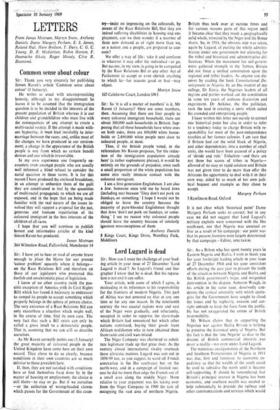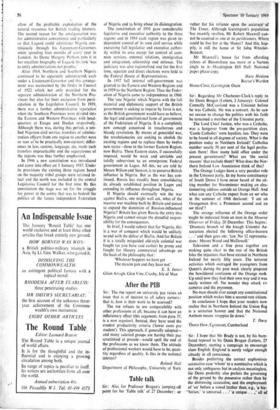Sir: As a Briton who has spent twenty years in
Eastern Nigeria and Biafra, I wish to thank you for your forthright leading article in your issue of 27 December 1968 and for your consistent efforts during the past year to present the truth of the situation between Nigeria and Biafra and the British government's tragic and misguided intervention in the dispute. Auberon Waugh, in his article in the same issue, deservedly con- demns the cynical amorality with which apolo- gists for the Government have sought to cloud the issues and by sophistry, evasion and out- right untruth to keep the facts from the public. He has not exaggerated the extent of British responsibility.
Mr Wilson claims that in supporting the Nigerian war against Biafra Britain is helping to preserve the historical unity of Nigeria. But the fact is that the 'one Nigeria' so dear to the dreams of British commercial interests .was never a reality—not even under Lord Lugard.
The notorious amalgamation of the Northern and Southern Protectorates of Nigeria in 1914 was due, first and foremost, to economic ex- pediency so that the wealth of the south could be used to subsidise the north until it became self-supporting. It should be remembered that Britain's principal interest in Nigeria has betn economic, and southern wealth was needed to help substantially to provide the railway and other communications and services which would
allow of the profitable exploitation of the natural resources for British trading interests. The second reason for the amalgamation was for administrative convenience and particularly so that Lugard could administer Nigeria con- tinuously through his Lieutenant-Governors while spending four months of every year in London. As Dame Margery Perham puts it in her excellent biography of Lugard, his task 'was to unify administrations not peoples.'
After 1914, Northern and Southern Nigeria continued to be separately administered, -each under a Lieutenant-Governor and this arrange- ment was maintained by the Order in Council of 1922 which not only provided for - the separate administration of the Northern Pro- vinces but also for their exclusion from parti- cipation in the Legislative Council. In 1939, there was a further .administrative separation when the Southern Provinces were divided into the Eastern and Western Provinces with head- . quarters at Enugu and Ibadan respectively. Although there was, during this period, a uni- fied Nigerian civil service, transfers of adminis- tration officers from one region to another were so rare as be practically non-existent; differ- ences in law, custom, language, etc, made such transfers impracticable and the separateness of the regions was thus further emphasised.
In 1946 a new constitution was introduced and came into effect on 1 January 1947. Under its provisions the existing three regions based on the majority tribal groups were retained in- tact and the north was included in the central Legislative Council for the first time. By this constitution the stage was set for the struggle for power at the centre that was to bedevil the politics of the future independent Federation of Nigeria and to bring about its disintegration.
The constitution of 1951 gave considerable legislative and executive authority to the three regions and in 1954 each region was given in- dependent control of its own civil service while exercising full legislative and executive author- ity within its area except for control of com- mon services, external relations, immigration and emigration, citizenship and defence. The judiciary was also regionalised and for-the first time, separate and direct elections were held to the Federal House of Representatives.
In 1957 full internal self-government was granted to the Eastern and Western Regions and in 1959 to the Northern Region. Thus the Feder- ation of Nigeria came to independence in 1960.
The 'one Nigeria' which Nigeria with the full material and diplomatic support of the British government is seeking to impcse by force is not, as the British government would have us believe, the legal and constitutional form of government of the Federation of Nigeria. It is a completely new concept conceived in treacherous and bloody revolution. By means of genocidal war, the revolutionaries are seeking to abolish the existing regions and to replace them by twelve new states—three in the former Eastern Region, now Biafra. These Eastern states, if successfully imposed, would be weak and unviable and totally subservient to an omnipotent Federal government in Lagos. All this, we are told by Messrs Wilson and Stewart, is to preserve British influence in Nigeria. But as the war has con- tinued, Russia has steadily been consolidating its already established position in Lagos and extending its influence throughout Nigeria.
If Nigeria should eventually win the war against Biafra, one might well ask, what of the massive war machine built by Britain and poised to expand the dominion of Russian-influenced Nigeria? Britain has given Russia the entry into Nigeria and cannot escape the dreadful respon- sibility for the consequences.
In brief, I would submit that for Nigeria, this is a war of conquest which would be unlikely to end with the defeat of Biafra. And for Britain it is a totally misguided old-style colonial war fought (as you have said earlier) by proxy and fought for illusory commercial advantage on the basis of the philosophy that: 'Whatever happens we have got The maxim gun and they have not.'



































 Previous page
Previous page